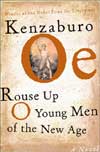 Loss Pequeño Glazier
Loss Pequeño Glazier
The University of Alabama Press ($24.95)
by Joel Weishaus
"Thus, I would argue that the task ahead is one of placing hypertext in the correct context, by working toward a more useful definition of e-writing, and of establishing a newly envisioned canon of e-literature...to engage a broader understanding of digitally based emerging literature."
I begin this brief critique of Loss Pequeño Glazier's Digital Poetics with the above quotation, agreeing that the standard definition of hypertext has grown too narrow. "Hyper" is typically defined as "existing in more than one dimension," which heralds a broader potentiality than its traditional role as linkage between Web pages. But I would go on to suggest that a "useful definition of e-writing" is not so desirable, as electronic writing needs less use-value and more uncommitted imagination. Nor is "a newly envisioned canon" helpful, as a canon is an academic weapon that fires from a prejudicial (and usually defensive) standpoint.
Much of Glazier's canon seems to consist of Language Poetry, a movement spawned in the 1970s in step with the poststructuralist linguistic theories coming out of France at that time, as well as Russian Formalism and Neo-Marxism. Needless to trudge through this thorny field here, but why is Langpo, or any school of innovative writing, more relevant to the electronic medium than other discourses? The author explains this by evoking its doctrine of "materialism," a track similarly being run by some cybernetics theorists. For example, N. Katherine Hayles, author of How We Became Posthuman, says that "materiality is a selective focus on certain physical aspects of an instantiated text that are foregrounded by a work's construction, operation, and content…(that) emerge from the interplay between the apparatus, the work, the writer and the reader/user." And in Cybertext, Espen Aarseth describes text as "a material machine, a device capable of manipulating itself as well as the reader." Glazier gets this down to a succinct formulation: "Materiality is important because writing is not an event isolated from its medium but is, to varying degrees, an engagement with its medium." Obviously. A pen is an engagement with paper, as is a typewriter, or a brush.
The computer itself is outwardly material—its discarded entrails now threaten the health of people in Third World countries who are paid to pick through middens of our poisonous cybertrash—but the e-writer's physical engagement is mainly with its keyboard, providing even less contact than with a typewriter, into which the writer had to roll a piece of paper, and sometimes come away with ink-stained fingers when changing a ribbon. But is digital text, as Glazier and other theorists contend, materialistic? My take on cyberspace is that it is more like the mind than the brain. One's mind is continually creating and manipulating words and images, in "real" time and in dreams; thus cyberspace is more ethereal than material, as are texts created in it.
My contention is not so much with the claim that language is, in a sense, material, a notion as old as hexes and prayers, but with how this applies to a medium which the author admits operates in "conditional space," and cautions, "All your text may not be received." Doesn't this pronounce electronic text as provisional? Of course there is "engagement with its medium," but until it's saved, electronic text only exists photonically; if one pushes the delete button by mistake, it vaporizes. An additional trope of digital text that needs to be elaborated is emergence, a property of a complex system that arises out of simpler constituents of that system, but is not reducible to, nor predictable from, its lower-level characteristics, just as digital text is not reducible to the computer, but is "genuinely novel."
Another procedure that makes electronic writing different than writing with a typewriter is that the computer can be, and usually is, seamlessly connected to a larger contingency called the World Wide Web. Many e-writers are regularly downloading information, uploading texts, and responding to e-mail from around the world. One is connected, but this is not a physicality, as attested to by the amount of theory that's been published on "disembodiment," but a dynamic. Which is why I found the author's litany of "material/materiality," from first page to last, extremely limited in imagination, especially in developing a poetics.
A subsection of Digital Poetics, entitled "ABC's of Coding," begins with lines from Walt Whitman:
There is something that comes home to one now and perpetually,
It is not what is printed or preached or discussed… it eludes
discussion and print...
Two pages later, Glazier lays down this HTML code:
<a href="http://epc.buffalo edu/authors">Authors</a>
<a href="http://epc.buffalo edu/e-poetry">E-Poetry</a>
<a href="http://epc.buffalo edu/ books">Books</a>
He comments, "These lines of code appear almost like a Whitmanesque catalog stanza (see Whitman epigraph above), the concatenation symbol acting as a repeated lexeme invoking variations on a string." I suspect Walt would have hooted, as did I, when reading this. Indeed, codewriting is something that had to happen. It extends naturally from software conventions, more so than from, as Glazier claims, pre-cybernetic innovative writing, such as that of John Cage's and Jackson Mac Low's chance operations, or Oulipo's constricted procedures. Codewriting does display a kind of semiotic elegance, but the author's unfortunate juxtaposition of an erotic poet like Whitman with website addresses of the Electronic Poetry Center at SUNY, Buffalo (where Glazier is a professor) shows how it suffers from a lack of moisture. It also bears the markings of another fetishization of language.
Throughout this book Glazier argues against narrative, a traditional Langpo target, saying "The old 'I write because I have a story to tell' offers neither an engagement with the materiality of new media nor with a society that needs to increasingly accept plural and non-egocentric viewpoints." By demonizing story, does he mean to cast out the humanities as relevant to digital poetics? No doubt we need "plurality and non-egocentric viewpoints," although, to highlight the many inconsistencies in this book, Glazier quotes Jerome McGann: "Poetry is language that calls attention to itself, that takes its own textual activities as its ground subject . . . ." While the poet should have a non-egocentric practice, his or her poems should be solipsistic? Although the Internet lends itself to collaboration over distance, we also need writers who stand behind their words, even with the knowledge that all language is virtually provisional. In fact, not materiality, but the development of an aesthetics of nonlocality, is the challenge that a poetics of cyberspace offers.
Inevitably, several important innovative writers have been left out of this book, which the author acknowledges. Also, as is intrinsic to the Internet, some referential links have already disappeared. Glazier's strategy seems to have been to publish a pedagogy, and, indeed, for students and faculty in Creative Writing departments, Digital Poetics is undeniably a valuable introduction to "the making of e-poetries." However, for writers already working in the field, this book tends to foreclose more than it opens.
Click here to purchase this book at your local independent bookstore

Click here to buy this book at Amazon.com
Rain Taxi Online Edition, Summer 2002 | © Rain Taxi, Inc. 2002
 n Watkins
n Watkins









